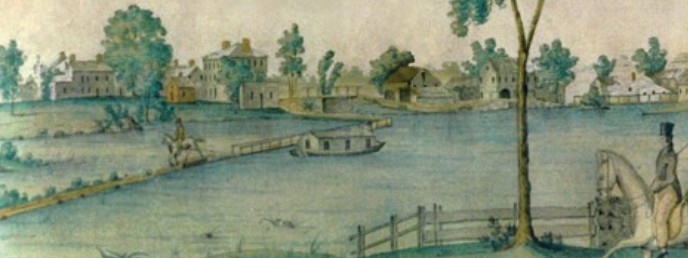


Middlesex Canal Association P.O. Box 333 Billerica, Massachusetts 01821
www.middlesexcanal.org
| Volume 54 No. 1 | September 2015 |
MCA ACTIVITIES
Please mark your calendars.
Saturday, October 3, 2015: The MCA is sponsoring a bicycle tour of the canal, north from Charlestown.
Sunday, October 18, 2015: The MCA/AMC Fall Walk will take place in the Wilmington Town Park.
Sunday, October 25, 2015: The MCA Fall meeting will be held at the Middlesex Canal Museum and Visitors’ Center, 71 Faulkner Street, North Billerica, MA. The guest speaker will be James Baldwin, great- great-great-great-great-great grandson of Loammi Baldwin.
Sunday, February 14, 2016: The MCA Winter meeting will be held at the Middlesex Canal Museum and Visitor Center, 71 Faulkner Street, North Billerica, MA. The guest speaker will be noted artist, author, and educator, Thomas Dahill.
All the events listed above are open to the public. See the Calendar of MCA Events section for more details. Please check the MCA website for lists of National and International canal-related events that are not included in this issue.
TABLE OF CONTENTS
Editors’ Letter
President’s Message (J.J. Breen)
Baldwin Dry Dock at USS Constitution Museum (J.J. Breen)
Calendar of MCA Events
Locks in Lowell (J. J. Breen)
MCC Billerica Sign Project (Alec Ingraham)
Dahill Square (Betty Bigwood)
A Volunteer Remembered (Betty Bigwood)
Tribute to Nolan Jones (Bill Gerber)
Baldwin/Sullivan Members of AMACAD (Howard Winkler)
Miscellany
EDITORS’ LETTER
Dear Readers,
Welcome to the first issue of Towpath Topics under new editorship! We will try our best to live up to the high standards of the previous editors, as we put our own stamp on the publication.
As we acquaint ourselves with the nuts and bolts of editing, we are hoping that we can continue to rely on submissions from the readership, similar to what we have included in this issue. Up first is an account of the MCA directors visit to the USS Constitution, followed by an article on the Baldwin Dry Dock. There is also a report about new historic markers in Billerica, one about Dahill Square in Arlington, research on the connection between the American Academy of Arts and Sciences and the Middlesex Canal, and sadly two obituaries of Middlesex Canal Association members. The local Calendar of Events is still a big part of this issue, so study it and mark your own calendars! All National and International Events can be found on the website.
Over the past months we have received many submissions relating to the Baldwin Family. Our plan is to begin using this information in the next issue, by first reprinting a speech given by George L. Vose in 1885 to the Boston Society of Civil Engineers called “A Sketch of the Life and Works of Loammi Baldwin Civil Engineer. Due to its length, we will run it like a serial, but then add other Baldwin Family genealogical and biographical information along with it. The speech is very informative and flowery as only 19th Century language can be. We hope you enjoy it as much as we did!
If we have made any mistakes, done anything irritating, or you have articles you want to send us, please contact us at:
alec2015@middlesexcanal.org or debfox2015@middlesexcanal.org
Please enjoy the issue,
Deb Fox and Alec Ingraham
PRESIDENT’S MESSAGE
by J. Jeremiah Breen, President; jj@middlesexcanal.org
John Baldwin, a descendant of the builder of the canal and a proprietor of the Middlesex Canal Association, emailed me on February 13, 2012, to say he had read Howard Winkler’s January, 2012 article, The Baldwin Dry Docks, and wondered if the Association would be interested in having the builder’s model of the dry dock for the museum. Yes! Tom Dahill volunteered to make the Baldwin exhibit, and it was soon advertised in the Massachusetts Secretary of State’s publication, Archaeology Month, October, 2012. With advertising and Google, the next year, Harrie Slootbeek of the USS Constitution Museum sought the Association’s and the Baldwin Family’s approval to borrow the model and exhibit it at the Charlestown Navy Yard since the USS Constitution was to be put into the Baldwin Dry Dock in 2015.
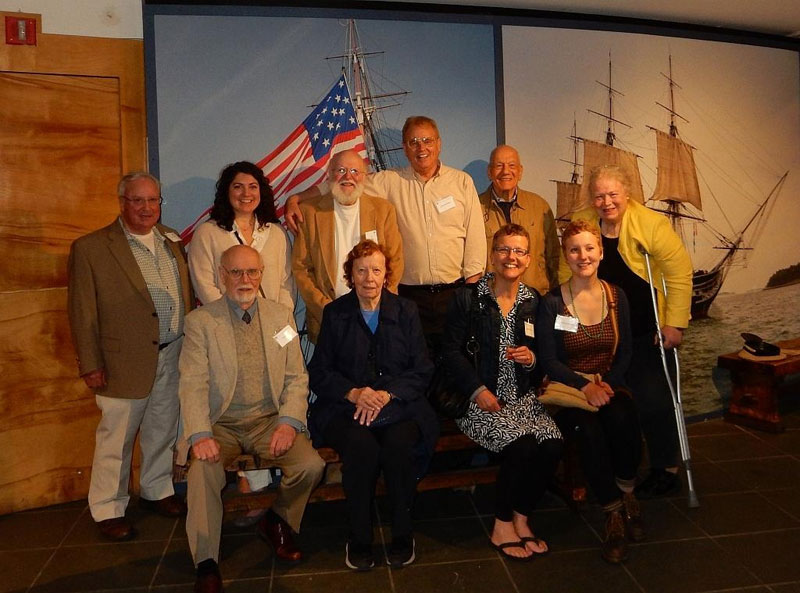
Back Row: Bill Gerber, Traci Jansen, Fred Lawson, J Breen, Howard Winkler, Betty Bigwood
Front Row: Tom Dahill, Jean Potter, Marlies Henderson, Anneloes Henderson
Baldwin Dry Dock at USS Constitution Museum
The Directors of the Middlesex Canal Museum were guests of the USS Constitution Museum at the June 3, 2015 party after Old Ironsides was again placed in the Baldwin Dry Dock. On June 24, 1833, it had been the first ship to enter it, and President Andrew Jackson came to Boston to celebrate the opening. At the party in 2015, Betty Bigwood would have liked for the president of the USS Constitution Museum in her speech to the guests to mention the 4,000 piles transported from New Hampshire down the Middlesex Canal to support the tons of granite of the dry dock. Mention that the engineer of the dry dock was the son of Loammi Baldwin, builder of the Middlesex Canal, “uniting the waters of [the Merrimack river] with the harbor of Boston . . . the greatest work of the kind which has been completed in the United States”, not surpassed until the Erie Canal, would have also gratified the museum’s particular guests.
In any event, the directors of the association present at the party had a very pleasant time, manifest in the group photo. Missing from the photo are Len Harmon, honorary director, and wife Diane. Another honorary director who went to to the party was Fred Lawson, an incorporator of the association in 1963. Marlies Henderson, with her daughter Anneloes, is not a director. She is a proprietor of the association and the Commonwealth’s newest Middlesex Canal commissioner.
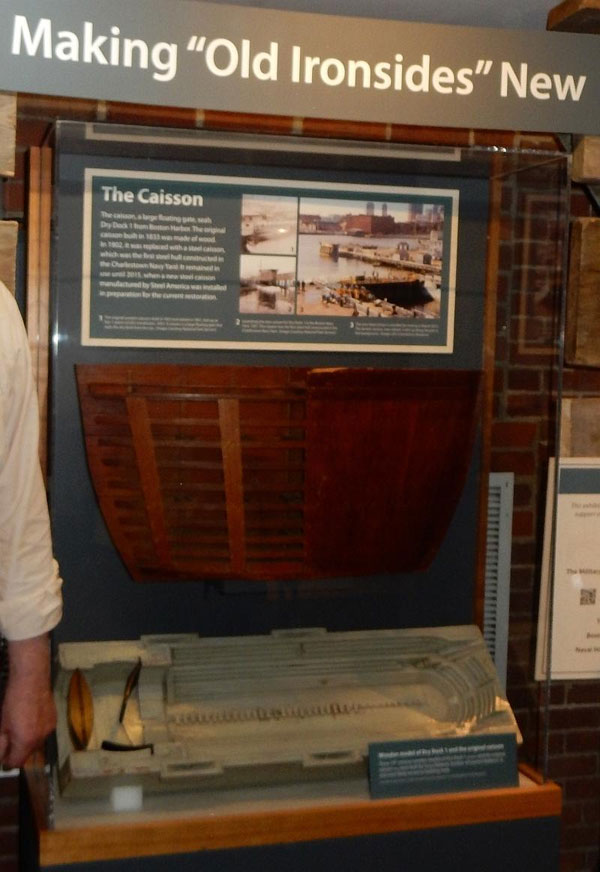
Baldwin Dry Dock Model
At the party the executive officer of the USS Constitution offered to guide a tour of the dry dock and ship the following Friday. The tourists were welcome to clamber up the granite ledges of the dock, run their hands over the copper cladding of the ship bottom, and in the ship, step into the starboard quarter gallery, a sort of Florida room for the captain built onto the side of the ship, away from the sound of four hundred sailors. A sort of reading room with a padded seatback and lid to the captain’s one-hole outhouse. None of the sailors on watch objected to the tourists clambering, feeling, and sitting about the dry dock and ship.
——————————
We need volunteers. If you can say Welcome!, you can be a volunteer at the museum. Simply come to the museum prepared to greet visitors at the reception desk. Even an hour on one of the hundred days a year we are open will allow the experienced docent to do other necessary work.
J. J. Breen, MCA President
CALENDAR OF EVENTS
Bicycle Tour: Saturday, October 3, 2015 – We will meet at 9:00am. at the Middlesex Canal plaque, Sullivan Square MBTA Station (1 Cambridge Street, Charlestown, MA 02129), follow the canal route 38 miles to Lowell. There will be a stop for a snack at Kiwanis Park across from Baldwin Mansion (2 Alfred Street, Woburn, MA 01801 ~ 12:30pm), stop for visit at the Canal Museum (71 Faulkner Street, North Billerica, MA 01862 ~ 3pm), and arrive in Lowell in time for the 5 P.M. train back to Boston. Google “canal ride cue sheet”. Riders can choose their own time to join or leave the group by using the Lowell Line which parallels the Canal. (i.e. An abbreviated ride can be done by parking at the Sichuan Garden, just off Route 128 at Route 38, cycling with the group to the museum and returning by train to Anderson/Woburn at 3:19pm, three miles from the Sichuan Garden.)
The ride will be an easy one for most cyclists. The route is pretty flat, and we will average 5 miles per hour. Along the way we will stop at several canal remnants and restored sections. Steady rain cancels. Helmets required. For more information: www.middlesexcanal.org.
MCA Fall Walk: Sunday, October 18, 2015 – The Appalachian Mountain Club and the MCA will host a walk along a 0.8 mile section of the Canal situated within a 14 acre tract in Wilmington. In 1983 this parcel was gifted by Stanley Weber and his daughter, Julia Ann Fielding, to the MCA. Although the fall foliage, the fresh air, and the camaraderie should be sufficient to encourage participation, as an added treat, Mike McInnis (from the Middlesex Canal Commission) and his wife, Diane, will serve lemonade and cookies for the walkers at the Patches Pond turnaround. Those planning to attend should meet at the Wilmington Town Park, opposite 760 Main Street, Wilmington, MA (Route #38) at 1:30pm.
MCA Fall Meeting: Sunday, October 25, 2015 – At 1:00pm the Middlesex Canal Association will hold a public meeting at the Middlesex Canal Museum and Visitors’ Center, 71 Faulkner Street, North Billerica, MA. The featured speaker will James Baldwin, the great-great-great-great-great-great grandson of Loammi Baldwin, the engineer who supervised the construction of the Middlesex Canal. Mr. Baldwin will make reference to items that have been passed down through the generations of Baldwins. One of these will be George Washington’s invitation to Col. Loammi Baldwin to visit him at what would become the Longfellow House – Washington’s Headquarters National Historic Site. Interestingly, the regiment Col. Baldwin commanded at the crossing of the Delaware River and the Battle of Trenton was known as the George Washington regiment.
At the beginning of the meeting the report of the Nominating Committee will be read and the election of officers and directors will take place.
For those planning to attend the James Baldwin’s October 25, 2015 lecture on the Baldwin Family, additional background information can be found in the following issues of Towpath Topics:
Volume 37; #2, March 1999: “The Baldwin Family” by Thomas Raphael
Volume 49; #2, January, 2011: “Biographies of James Sullivan and Loammi Baldwin” Transcribed by Howard Winkler
Volume 50; #3, March 2012: “The Middlesex Canal - It was a Family Thing” by Bill Gerber and Susan Williams
MCA Winter Meeting: Sunday, February 14, 2016 – At 1:30 P.M. the Middlesex Canal Association will hold a public meeting at the Middlesex Canal Museum and Visitors’ Center, 71 Faulkner Street, North Billerica, MA. The featured speaker will be noted artist, author, and educator, Tom Dahill, Professor Emeritus of Fine Arts at Emerson College. The topic of his talk will be the two watercolors of the Middlesex Canal Summit Pond (circa 1822) in North Billerica. Both were allegedly painted by Jabez Barton during his courtship of Rebecca Farmer Rogers, daughter of William and Hannah (Farmer) Rogers. A View from William Rogers House (Billerica Historical Society) provides a priceless early image of the floating towpath and the North Billerica Mill Village. The William Rogers House (New York Historical Society) is portrayed in the scene from the opposite side of the summit pond. The William Rogers House was built about 1807 reportedly partly from funds earned by William in service of the Canal Proprietors, and stands today on Rogers Street.
Professor Dahill’s presentation will be followed by a brief business meeting.
For those planning to attend Professor Dahill’s February 14, 2016 lecture on the Barton watercolors, additional background information can be found in the following two publications:
Seaburg, Carl; Seaburg, Alan; & Dahill, Thomas. The Incredible Ditch: A Bicentennial History of the Middlesex Canal. The Anne Miniver Press for the Medford Historical Society, 1997.
Seaburg, Alan. Life on the Middlesex Canal. The Anne Miniver Press History of American Transportation Publications, 2009.
The Middlesex Canal Museum and Visitors’ Center is open every Saturday and Sunday, noon-4, except holidays.
MCA Board of Directors’ Meetings - The Board meets at the Canal Museum from 3:30pm to 5:30pm on the first Wednesday of each month with the exception of July and August. Members are welcome and encouraged to attend.
Directions to the Museum/Visitors Center: Telephone: 978-670-2740.
By Car: From Rte. 128/95, take Route 3 toward Nashua, to Exit 28 “Treble Cove Road, North Billerica, Carlisle”. At the end of the ramp, turn left onto Treble Cove Road toward North Billerica. At about ¾ mile, bear left at a fork. After another ¾ mile, at a traffic light, cross straight over Route 3A. Go about ¼ mile to a 3-way fork; take the middle road, Talbot Street, which will put St. Andrew’s Church on your left. Go about ¼ mile and bear right onto Old Elm Street. Go about ¼ mile to the falls, where Old Elm becomes Faulkner Street; the Museum is on your left and you can park across the street on your right, just beyond the falls.
From I-495, take exit 37, N. Billerica, south to the road’s end at a “T” intersection, turn right, then bear right at the Y, go 700’ and turn left into the parking lot. The Museum is across the street.
By Train: The Lowell Commuter Line runs between Boston’s North Station and Lowell’s Gallagher Terminal. Get off at the North Billerica station, which is one stop south of Lowell. From the station side of the tracks, the Museum is a 3-minute walk down Station and Faulkner Streets on the right side.
LOCKS IN LOWELL
by J. J. Breen
A three-lock staircase was completed in 1798 by Loammi Baldwin on the south bank of the Merrimack River.
Each lock is 11’ x 84’, sufficient to accommodate the maximum boat allowed by the canal company, 9½’ x 75’. The width is based on Lewis Lawrence who wrote in 1942’s Middlesex Canal, p. 105, that locks generally were 10 feet wide at the bottom, 11 feet wide at the top. The length is based on George Rumford Baldwin’s 1829 survey showing the distance between the first and last miter gate to be 3 chains, 80 links (250.8’). The lift of a lock is 8’ based on Baldwin’s 1830 profile showing that the difference in elevation between the highest miter sill and lowest is 24.31’. The lift of 24.31’ from the Merrimack to the canal agrees with the 24’ 6” lift in the 1794 report of William Weston, the English engineer who was a consultant to the canal company. The report is Appendix 2 of Mary Stetson Clarke’s Old Middlesex Canal, 1974.
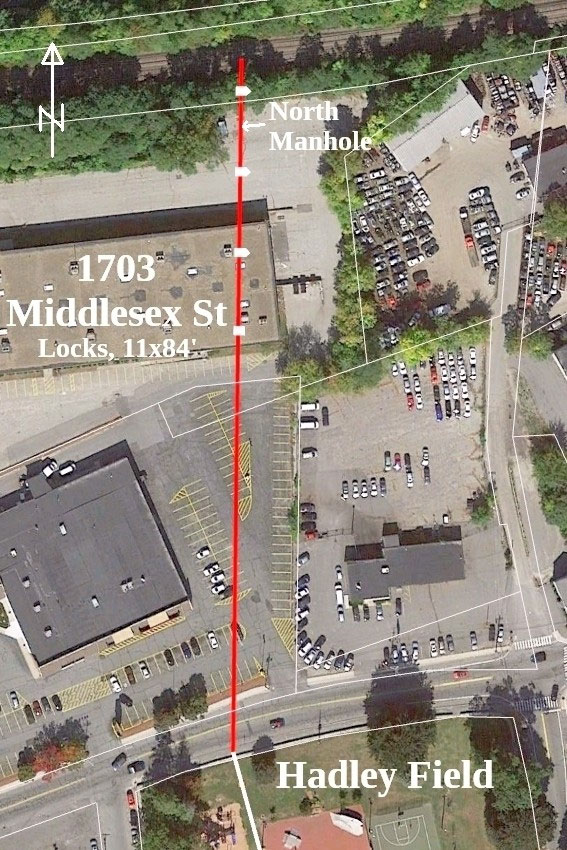
The four miter gates of the three locks are located in white on the red line of the canal
Loammi Baldwin on March 13, 1797 wrote to Weston that the first course of granite “about 5 feet in breadth & 20 inches in height was all laid in Terras mortar”. Lawrence, p. 25. The granite came from Tyngsborough and the terras, a volcanic rock used to make a mortar that would harden underwater, was imported by chartered sloop from a Caribbean island. The 400 tons of terras delivered to the construction site cost $3800 (Lawrence, p. 24) which is ~ $1.5 million today based on Harvard president’s pay of $1,400 in 1800 compared to $640,000 in 2009. Given the great expense of granite blocks and hydraulic cement, the directors of the canal company chose to build the rest of the locks of wood with drystone retaining walls. The wood locks rotted. The granite locks survived.
In 1860, Samuel Hadley, the former locktender, sold the granite from the 62-year-old locks to the Nashua & Lowell Railroad. The sale was part of a plan whereby the railroad bought land the Canal Company had reserved for passage under the railroad when the railroad bought a right-of-way across canal company land in 1849. In 1860, the railroad intended to replace the iron bridge over the former canal with a culvert.
“Also all of my right and interest in the stone now remaining at the locks of said Middlesex Canal near said premises, with the right of entry upon and passage through my land, in a convenient manner and direction, for the purpose of removing and loading said stone on to the cars at or near where the said Iron Bridge now is, said right of entry and passage to continue for one year from the date hereof [April 21, 1860] for the stone of the upper lock, and two years from the date hereof for the remainder.” — North Middlesex Registry, book 23, p. 446.
Note that the railroad was not required to remove the granite. In 1911, Judge Samuel Hadley, the son of the former locktender, published the following:
“The only relics of this old public work at Middlesex Village are the collector’s toll house erected in 1832, which I have endeavored, with poor success, to save from the depredations of tramps and mischievous boys, – the cellar of the storehouse, and a large part of the stone-work of the lower lock, which although under the water of the inflowing river, is still intact.” — Samuel P. Hadley, “Boyhood Reminiscences of Middlesex Village”, Contributions of the Lowell Historical Society, 1911, Vol. 1, No. 2, p. 242.
The location of the lower lock can be determined from the railroad culvert which replaced the iron bridge in 1860, identified from the Nashua & Lowell 1914 valuation plans as #63C, 5’x5’ stone, at station 1447+14 from Nashua. The culvert is drawn midway between the abutments of the former bridge. The Boston & Maine has a 4”x4” concrete post identifying it as 27.37 miles from North Station. After lengthening by the rail road at both ends (since 1860), the culvert outlet is currently a 42”x48” concrete opening, and the inlet is a junction box with a 5’ diameter pipe at the end of a ditch on the south side of the railroad. The junction box was likely built in 1983 after approval of the December 1982 plan for dividing the property.
Plotting George Baldwin’s 1829 survey in Google Earth, using the culvert and the Long Block, 139-143 Baldwin St, as known points, the accuracy of the distance along the line of the canal from the Long Block to the miter gates is likely ± 10’. The precision possible with 1829 compass bearings measured to a ¼° with an estimated magnetic declination over hundreds of feet extended from the known point of the Long Block is much less than that possible with distance by a Gunther’s chain. Rather than an imprecise location using compass bearings from the known Long Block location, the better solution is to assume that the junction box at the inlet to the 1860 railroad culvert is on the line of the canal. A back bearing from the junction box using the 1829 compass measurement will establish the line of the canal ± 10’ within fifty feet of the junction box. See also note 3. With these two measurements, the location on a horizontal plane of the miter gate between the first and second locks is known within a circle of 10’ radius.
The vertical location of the lower lock was measured by George Baldwin in 1830 at its lower miter sill as 83.25’ above a zero at the Charles River. The 83.25’ of Baldwin is equal to elevation 79.41’ (Sea Level Datum of 1929, NGVD29. For Baldwin and the conversion factor, see Towpath Topics, Sept 2013, p. 9). With a design depth of 3.5’, lift of 8’, and 1’ to towpath, total 12.5’, the top of the lock is el. 91.91’. As seen in the Google Earth photo, the ground above the first lock is a paved parking lot.
In the parking lot are two manholes in the roof of the junction box at the inlet to the extended 1860 railroad culvert. The northern of the two manholes is at the outlet of a 5’ diam. reinforced concrete pipe into the junction box. Its rim is 11.9’ above the floor of the junction box and 10.9’ above the standing water in the box. When 10.9’ was measured, the gage at the Pawtucket Dam measured 4’-2½” which is el. 91.2’ (NGVD29). The rim of the manhole is el. 102.1’ (91.2 + 10.9) plus the rise in the headpond at the 1860 culvert, 6,600’ upriver of the dam, a rise much less than a foot. With the manhole rim at ground level, the top of the lock is 11’ below ground (102.1’ + rise - 91.9’, or 10.2’ + say 0.8’ rise).
The 11’ below ground is based on the first lock having 12½’ granite walls as described above, but the following description has 8’ walls for the first lock:
“That part of the Canal, which is in Chelmsford is 25 feet above the waters of Merrimack river, from which you ascend by means of three locks formed of split stone, laid in mortar. [The book as available on the internet has 25 written over a printed 3.] The lock next to the river is called the first lock. This is ninety feet long and twelve wide. The earth is removed below the bed of the river to prevent the undermining of the works, and then filled up with stones, on these a floor of oak timber, two feet square is laid ; upon this another floor of similar timber is laid cross wise, and then a floor of three inch plank, all well spiked and trunnelled. On this base the walls are raised 8 feet high and 7 feet thick. The walls are constructed of hewn stone, taken from a ledge in the neighborhood, which is the property of the corporation. These stones easily split, and readily yield to the stroke of the hammer. The second and third locks are of the same length, and constructed of similar materials. The height of the second is 16’, that of the third 14 feet. The culverts and gates are so well contrived, that a boat or raft may pass the three locks, in 8 minutes. The workmanship of these locks for neatness and strength is equalled by none in the United States.
“The naturalist will be gratified to learn that on digging over the earth on the bank of Merrimack River, to lay the foundation of the locks, pine cones and charcoal were found at the depth of twelve feet from the surface, in a sound and unimpaired state, specimens of which are deposited in the museum at Cambridge. A small horn was also found at nearly the same depth from the surface, supposed to be that of a cow of two or three years old.” History of Chelmsford by Wilkes Allen, 1820, pp. 73-74. Allen’s description also published in The Incredible Ditch by Carl and Alan Seaburg, 1997, p. 105.
Wilkes Allen’s description sets the top of the wall more like 15’ below the manhole rim. Allen, born in Shrewsbury in 1775, graduated from Harvard in 1801, and not known to be a resident of Chelmsford until called as the minister of the First Church in 1803, was unlikely to have had personal knowledge of the building of the locks. He has the walls 7’ thick and each lock 90’ long. Loammi wrote that the first course was about 5’ in breadth (Lawrence, p. 25); Western recommended brick 4’ 2” thick (Lawrence, p. 24); and George Baldwin in his 1829 survey measured three locks together at 251’. But Allen likely spoke with individuals who did have personal knowledge of the construction. Cyrus Baldwin, son of the builder, lived at the locks and asked Allen for his manuscript as agent of town which paid for the printing of 400 copies. Allen, after the title page.
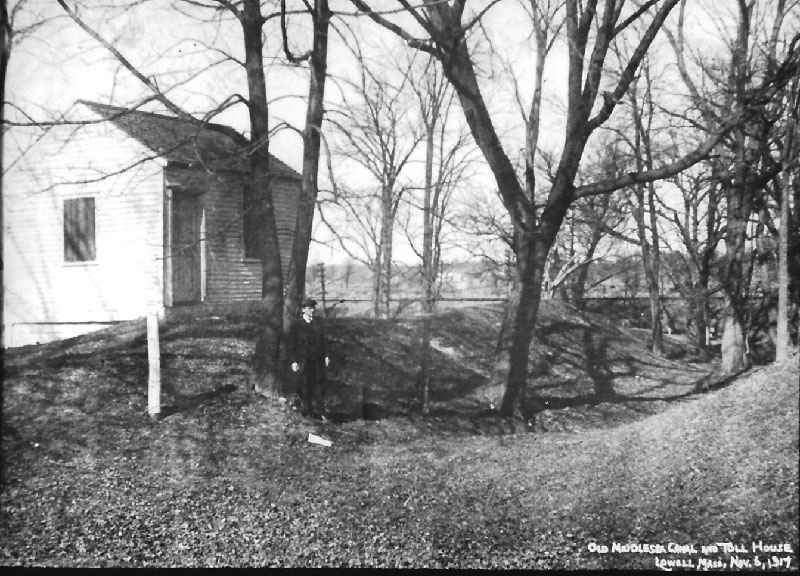
Locks in Lowell, 1917
Leon Cutler lantern slide #2, owned by Fred Lawson, print/38 mm slide #94
made by Tom Raphael, print in Middlesex Canal Association library
The top of the lower lock if 12½’ at 91.9’ is just below the top of the Pawtucket Dam’s 5’ flashboards, el. 92.0’. The top is 4½’ lower with Allen’s 8’ walls. Judge Hadley published in 1911 that “a large part of the stone-work of the lower lock, which although under the water of the inflowing river, is still intact.” The 1917 photo shows the water backed up through the railroad culvert over the lower lock.
“cleaned out 1st Lock Middlx Canal stopped the Bucket machine I passed down the E. culvert & up the west marked LB Oct. 20, 1796 on the mouth of E. Culvert bottom Stone.” — Loammi Baldwin, age 51, in Lawrence, p. 24, from the Baldwin manuscripts, Baker Library, Harvard. The builder’s initials are likely still there.
Notes
1. George R. Baldwin’s 1830 profile of the locks is at: http://tinyurl.com/otbfylc.
The locks are drawn with the same lift. The complete plan and profile are at: https://archive.org/details/Middlesex_Canal_Plan_and_Profile
2. Allen’s 1820 description of the locks is also published in The Incredible Ditch by Carl and Alan Seaburg, 1997, p. 105.
3. The accuracy of the canal bearing would be confirmed by its being parallel as seen in the Google photo to the western boundary of the lot on the NW corner of Baldwin and Middlesex Sts., site of the old Middlesex Tavern, if the deed uses the canal as a basis for the
boundary.
HISTORIC TRANSPORTATION SYSTEMS MARKER PROJECT
by Alec Ingraham
The Middlesex Canal Commission: Billerica Section wishes to announce the completion of the Historic Transportation Systems Marker Project. During the first phase of the initiative, signposts were placed where the long abandoned routes of Middlesex Canal and the Billerica and Bedford Railroad intersected major thoroughfares in Town.
During the second phase, larger markers were placed adjacent to the locations of noteworthy remains of the transportation systems. Each marker contains a synopsis of the artifacts’ significance. These indicators can be found at the following locations:
| Artifact | Transportation System | Years in Service | Location |
| Shawsheen Aqueduct | Middlesex Canal | 1793-1853 | Rte # 129 at Billerica/Wilmington Town Line |
| Floating Towpath | Middlesex Canal | 1793-1853 | Adjacent to #2 Old Elm Street |
| Mill Dam | Middlesex Canal | 1793-1853 | East of #2 Old Elm Street |
| Northern Terminus | Billerica and Bedford Railroad | 1876-1878 | North Billerica MBTA Station |
| ~17 miles from West Boston Bridge | Middlesex Turnpike | 1805-1841 | Intersection of Concord Road and Middlesex Turnpike |
Funding for the 6 year volunteer effort was secured from a Flik Systems Community Grant, the Greater Lowell Community Foundation Grant to Andrew Bowen, and the Billerica Historical Commission. The Commissioners also wish to thank the Billerica Historical Society, the Middlesex Canal Association, John and Isabel Reardon, and the Town of Billerica for their steadfast support of the initiative.
Respectfully submitted,
Alec Ingraham
Debra Fox
Marlies Henderson
Charles Anderson
Andrew Bowen
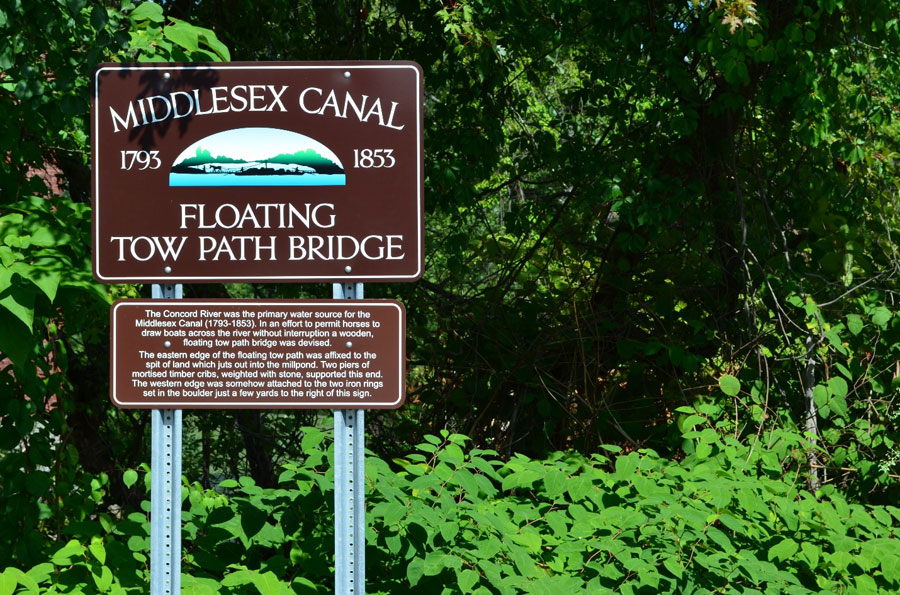
THE DAHILL SQUARE – A PATRIOTIC FAMILY
by Betty M. Bigwood
Thomas Henry Dahill Jr. is known affectionately as Tom or “The Great Artist”. He now has an additional title – resident of The Dahill Square.
Quietly, a niece applied to the Veterans Association and the Arlington Board of Selectmen for the privilege of naming the corner of Broadway and Allen Street to commemorate the service to the country by several generations of the Dahill family. The announcement was made in October 2013.
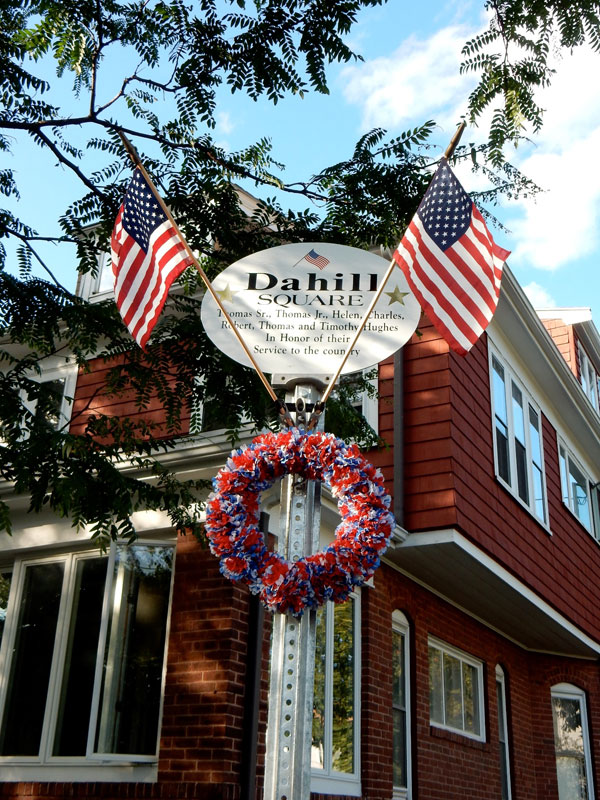
Dahill Square Sign: Broadway and Allen Streets, Arlington, MA
Tom was taken completely by surprise and was, of course, delighted.
Several generations have fought for this country. Tom’s Great Grandfather came from Ireland as a brick mason and fought in the Civil War. Grandfather Jeremiah Dahill built the current brick house which has become the family “seat”. Tom’s father served in WWI and afterwards moved his family of seven into the house. It was a happy, lively family which Tom depicted in his sketch of the house. Three siblings served in WWII. Two niece’s sons have been in the service recently.
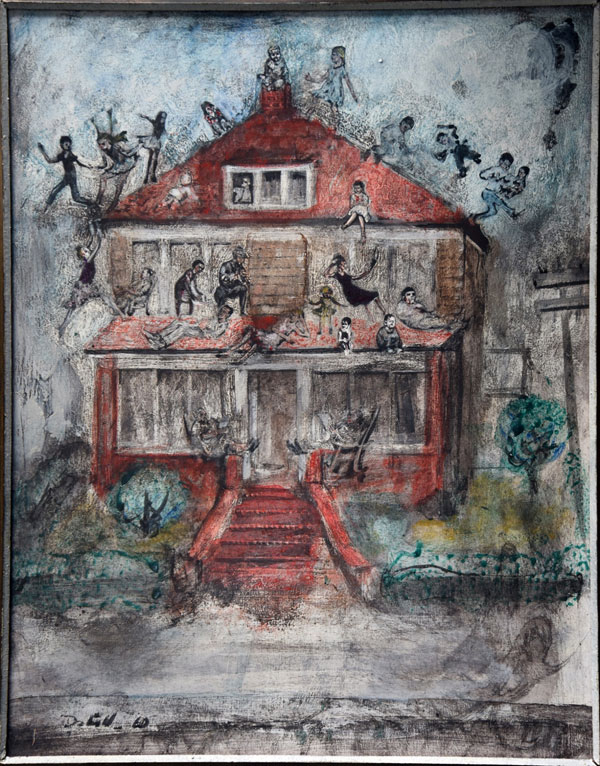
“The Homestead”
[It shows my parents on the front porch (of my home in Arlington) in rockers, and the rest of the family scattered all over the exterior.
I am in the attic window. It was a Christmas present to my parents in 1960.] {Excerpts from notes supplied by Tom Dahill}
Tom served in WWII as an Aerial Navigator in the South Pacific in the Army Air Corp of the US Army. When I asked Tom how it came to be that he was accepted having had Rheumatic Fever as a child, he replied “I didn’t lie, they never asked.” Tom recently told me he had flown 36 missions.
There is now a sign with names of those Dahills who have served with two American flags prominently waving from the street side identifying the area as Dahill Square. It is maintained by the veteran’s organizations of Arlington, MA.
In June this year, Tom’s Ninetieth Birthday celebration was a big family affair at the Dahill home. Stories were exchanged about many years of family Christmas celebrations there. They all remembered the house, the good times and sense of family spirit.
A VOLUNTEER REMEMBERED
by Betty M. Bigwood
Donald and Lois Jenkins have volunteered for years to docent at our museum on weekends. Don passed away on May 13, 2015. Their elegant kindness and generosity gave a welcome break to those who grow weary of the routine. Guests were frequently offered coffee or tea and cookies as they viewed the exhibits.
Don had a busy and productive life. He served in World War II as a U.S. Air Corps First Lieutenant, Navigator B-24 bomber with 40 missions over Germany and Austria. He received numerous medals and citations among which is the Distinguished Flying Cross. He graduated from MIT. Don and Lois have two sons. He will be very much missed.
Excerpts from his obituary (Douglass Funeral Home):
Donald Jenkins
(Died May 13, 2015)
“Jenkins, Donald Jr. of Bedford, Massachusetts, formerly of Lexington, May 13, 2015. Husband of Lois V. Jenkins (Brown). Father of David E. Jenkins and his wife Ai Li of Germantown, TN and Paul W. Jenkins of Bedford. Also survived by his grandson Benjamin A. Jenkins. WWII U. S. Army Air Corps, First Lieutenant, navigator B-24 Bomber with 40 missions over Germany and Austria. Among his medals are the Distinguished Flying Cross, WWII Army Air Corps Air Medal, Good Conduct Medal, American Campaign Medal, European African Middle Eastern Campaign Medal, and Army Air Corps Victory Medal. Graduated from MIT in 1948. An active member of the First Baptist Church of Lexington. An active volunteer in the community, including Board of Directors and Board of Investment of the Lexington Savings Bank, President of the Lexington Golf Club, member of the Finance committee of the Lexington Historical Society, a Lexington Town Meeting Member and a member of the Executive and Finance Committees of the Bedford Historical Society, and a member of the Bedford Food Pantry.”
Burial was at Westview Cemetery in Lexington. Memorial gifts in his name may be made to the Lexington First Baptist Church Mission Fund, 1580 Mass Avenue, Lexington, MA 02420 or the International Fund for Animal Welfare, Post Office Box 97105, Washington, D.C. 20090-7105.
TRIBUTE TO NOLAN JONES
by Bill Gerber
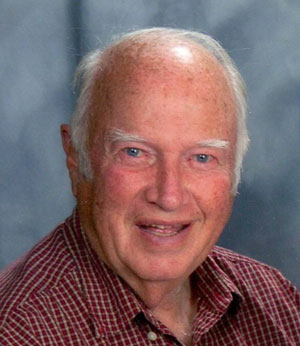 Nolan T. Jones, age 88, of Sacramento CA, formerly a long-time resident of Winchester MA, passed away on July 14, 2015. Nolan was the longest serving President of the Middlesex Canal Association, having held the office for a total of about 18 years.
Nolan T. Jones, age 88, of Sacramento CA, formerly a long-time resident of Winchester MA, passed away on July 14, 2015. Nolan was the longest serving President of the Middlesex Canal Association, having held the office for a total of about 18 years.
Nolan suffered a stroke about 5 years ago, from which he only partially recovered. Soon after, he and his wife, Joan, moved to California to be near Nolan’s daughter and her family.
In a recent birthday greeting, Betty Bigwood wrote: “You served as President of the Middlesex Canal Association longer than anyone and we thank you for your many years of service - all 18 of them. You handled our meetings with confidence and grace - the association was in good hands. We loved your aerial photographs taken when you flew over the entire length of canal - they helped in planning and understanding. You led more than your share of walks and with Joan often docented at the Museum.”
Born in Manhattan KS, Nolan served in the US Navy during the final months of WWII. He was stationed in California, serving as an Electrician and Technician Mate, Second Class, in ETM School in San Francisco, Treasure Island. Following his discharge from the Navy, Nolan used his GI Bill benefits to attend the University of Nebraska in Lincoln. He earned a BS there, followed by a MS from the Massachusetts Institute of Technology, both in Electrical Engineering. Nolan was especially proud of being involved in early computers, including the “Whirlwind” while at MIT. Thereafter he worked his entire career for Mitre Corporation in Bedford MA.
Nolan married Beverly M. McCoy of Minneapolis MN who predeceased him in 1981. Subsequently Nolan married Joan Lloyd Borum with whom he enjoyed Democratic politics and exploring the historic canals of Europe, Canada, and the US.
While in Winchester (1963-1985), he was active in the Unitarian Church, the Conservation Commission, and the Middlesex Canal Association. Nolan was an Eagle Scout and was very active in the Boy Scouts of America in various capacities for fifty years, earning the Silver Beaver award for distinguished service. Nolan’s interests included bridge, camping, conservation, historic canal preservation, and tinkering with electronics.
He is survived by his wife Joan, her children Christopher Borum (Michelle) of Minneapolis MN, Owen Borum (Jennifer) of Boulder CO and three step- grandchildren, and his children Susan Jones (David Wright) of Sacramento CA, Nolan Thomas Jones Jr of Mt. Carmel UT, and Cynthia Jones (Fred LaPlante) of Woodinville WA, as well as his grandson Galen.
“The purpose of life is ... to be useful, to be honorable, to be compassionate, to have it make some difference that you have lived and lived well.” — Ralph Waldo Emerson.
Friends wishing to make a remembrance gift for Nolan may send a contribution to the Middlesex Canal Association, c/o Howard Winkler, 1010 Waltham St., Lexington, MA 02421.
BALDWINS AND SULLIVANS WERE MEMBERS OF THE
AMERICAN ACADEMY OF ARTS & SCIENCES
by Howard Winkler
Earlier this spring, I accompanied my wife to a college alumni meeting. It was held in the American Academy of Arts & Sciences in Cambridge. The college rented their magnificent facility for the afternoon. During the get-together collation, I walked about looking at the wall hangings, and was somewhat surprised to see the portrait of Benjamin Thompson.
After I got home, I looked up the American Academy. It’s a non-governmental organization founded in 1780, and over the years has elected more than 4,000 Fellows and 600 Foreign Honorary Members (FHM) including more than 200 Nobel Prize laureates and more than 100 Pulitzer prize winners.
I wondered if the Baldwins and Sullivans were members, and went to the Academy’s internet site at https://www.amacad.org, and found that they were indeed members. Their citations follow.
Baldwin, Loammi (1745-1807)
Election: 1782, Fellow
Affiliation at Election: Woburn, MA
Residence at Election: Woburn, MA
Career description: Civil Engineer
Baldwin, Jr., Loammi (1780-1838)
Election: 1810 Fellow
Affiliation at Election: Charlestown, MA
Residence at Election: Charlestown, MA
Career description: Engineer; Lawyer
Baldwin, James Fowle (1782-1862)
Election: 1841, Fellow
Affiliation at Election: Boston, MA
Residence at Election: Boston, MA
Career description: Engineer; Government official
Baldwin, George Rumford (1798-1888)
Election: 1871, Fellow
Affiliation at Election: Woburn, MA
Residence at Election: Woburn, MA
Career description: Civil Engineer
Sullivan, James (1744-1808)
Election: 1780, Fellow
Affiliation at Election: Massachusetts Supreme Judicial Court
Residence at Election: Groton, MA
Career description: Lawyer, Governor of Massachusetts, Jurist
Elected in 1780
Sullivan, John Langdon (1777-1865)
Election: 1810, Associate Fellow
Affiliation at Election: Middlesex Canal
Residence at Election: Boston, MA
Career description: Engineer, Company executive, Physician
For the sake of completeness, I found Thompson’s citation.
Thompson, Benjamin (Count Rumford) (1753-1814)
Election: 1789, FHM
Affiliation at Election: Government of Bavaria
Residence at Election: Munich, Germany
Career description: Physicist, Inventor, Military officer, Social and military
Reformer
MISCELLANY
Nameplate - Excerpt from a watercolor painted by Jabez Ward Barton, ca. 1825, entitled “View from William Rogers House”. Shown, looking west, may be the packet boat George Washington being towed across the Concord River from the Floating Towpath at North Billerica.
Back Page - Excerpt from an August,1818, drawing (artist unknown) of the Steam Towboat Merrimack crossing the original (pre-1829) Medford Aqueduct, probably on its way to service on the Merrimack River.
Estate Planning - To those of you who are making your final arrangements, please remember the Middlesex Canal Association. Your help is vital to our future. Thank you for considering us.
Museum & Reardon Room Rental - The facility is available at very reasonable rates for private affairs, and for non-profit organizations’ meetings. The conference room holds up to 60 people and includes access to a kitchen and rest rooms. For details and additional information please contact the museum at 978-670-2740.
Back Issues - Fifty years of back issues of Towpath Topics, together with an index to the content of all issues, are also available from our web site at http://middlesexcanal.org/towpath. These are an excellent resource for anyone who wishes to learn more about the canal and should be particularly useful for historic researchers. Instructions for conducting a word search within the back-issues archive can be found in TT 1/2014, see “Searching our Online Archives”.
Museum Shop - Looking for that perfect gift for a Middlesex Canal aficionado? Don’t forget to check out the inventory of canal related books, maps, and other items of general interest available at the museum shop. The store is open weekends from noon to 4:00pm except during holidays.
The first issue of the Middlesex Canal Association newsletter was published in October, 1963. Originally named “Canal News”, the first issue featured a contest to name the newsletter. A year later, the newsletter was renamed “Towpath Topics.”
CANAL NEWS
Published by the Middlesex Canal Association
Billerica, Massachusetts
Vol. 1, No. 1 October, 1963
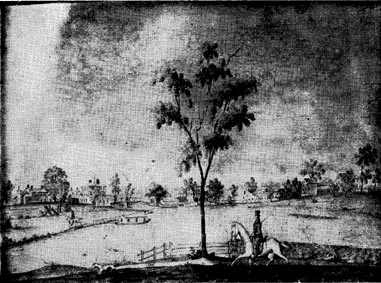
Questions: Who won the “newsletter naming” contest? What was the prize?

Towpath Topics is edited and published by Debra Fox, Alec Ingraham, and Robert Winters.
Corrections, contributions and ideas for future issues are always welcome.